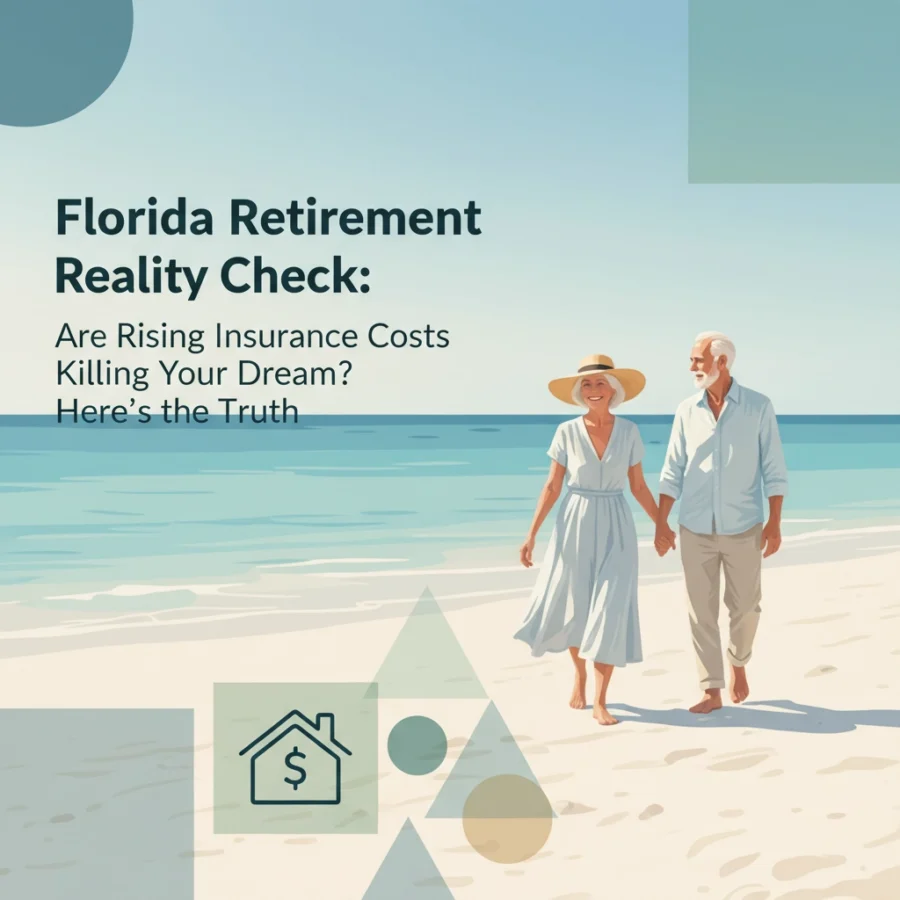The dream of retiring to Florida's warm beaches and tax-friendly environment is colliding with a harsh reality: insurance costs are spiraling out of control. If you're planning to retire in the Sunshine State: or you're already here: you need to understand how dramatically the insurance landscape has changed and what it means for your financial future.
The numbers are staggering. Property insurance premiums have doubled in recent years, and approximately half of Florida residents are now considering leaving the state due to rising costs. For retirees living on fixed incomes, these increases aren't just inconvenient: they're potentially devastating to carefully crafted retirement plans.
The Perfect Storm Hitting Florida Insurance
Florida's insurance crisis didn't happen overnight. It's the result of multiple factors converging to create what experts call a "perfect storm" of risk and cost.
Hurricane Risk Concentration
Florida accounts for more than 70% of all U.S. hurricane-related insurance losses, despite representing just 6% of the population. Beyond hurricanes, the state faces constant threats from flooding, sinkholes, and severe windstorms. Each major storm event sends shockwaves through the insurance market, forcing companies to reassess their exposure and pricing models.
The Litigation Epidemic
Here's the shocking truth: Florida represents only 8% of the nation's homeowner's insurance claims but nearly 80% of all insurance-related lawsuits. This isn't coincidental: it's the result of systematic abuse of the Assignment of Benefits (AOB) process.
Under AOB, homeowners can sign over their insurance claim rights to contractors, who then sue insurance companies for inflated repair costs. In 2021 alone, $3 billion was paid out in legal costs: much of it going to attorneys rather than homeowners actually affected by damages. This litigation abuse directly translates to higher premiums for everyone.

Reinsurance Reality
Insurance companies protect themselves by purchasing reinsurance: essentially insurance for insurers. Due to Florida's repeated catastrophic losses, global reinsurers now charge massive premiums to provide coverage in the state. These costs get passed directly to homeowners, creating a cycle where each storm season brings higher premiums the following year.
How This Impacts Your Retirement Planning
For current and prospective Florida retirees, these insurance realities create several critical planning challenges:
Budget Destruction
When homeowner's insurance jumps from $2,000 to $4,000 annually: or more: it can destroy carefully calculated retirement budgets. Unlike other expenses, insurance isn't optional if you own property or have a mortgage.
Asset Protection Concerns
Rising insurance costs create a double threat. Not only do they drain cash flow, but inadequate coverage due to cost-cutting can leave your most valuable asset: your home: vulnerable to catastrophic loss. This is where comprehensive estate planning becomes crucial to protect your family's financial legacy.
Market Limitations
Since 2017, more than a dozen insurance companies have either gone bankrupt or stopped writing new policies in Florida. When major insurers like AAA and Farmers exit the market, retirees face fewer choices and often must turn to Citizens Property Insurance Corp., Florida's state-run insurer of last resort.
Citizens currently insures over 1.3 million properties, making it the largest property insurer in Florida: and potentially the most financially vulnerable if a major hurricane strikes.
The Hidden Costs Beyond Property Insurance
Property insurance isn't the only concern. Florida retirees face rising costs across multiple insurance categories:
Flood Insurance Requirements
Standard homeowner's policies don't cover flood damage. With changing weather patterns and development pressures, areas previously considered low-risk now require expensive federal flood insurance. These policies can add $1,000-$3,000 annually to your insurance costs.
Auto Insurance Impacts
Florida's no-fault auto insurance system, combined with high fraud rates, keeps auto insurance premiums among the nation's highest. For retirees who assumed their auto costs would decrease in retirement, this represents another budget surprise.
Healthcare Premium Pressures
While Florida offers no state income tax, healthcare costs continue rising. Medicare supplement plans and long-term care insurance premiums increase annually, and these costs compound over time.

Strategic Responses for Florida Retirees
Despite these challenges, Florida retirement remains viable with proper planning and realistic expectations. Here's how smart retirees are adapting:
Insurance Optimization Strategies
Rather than simply accepting higher premiums, work with knowledgeable agents to optimize your coverage. This might include:
- Raising deductibles to lower premiums
- Bundling policies for discounts
- Installing storm shutters or impact windows for premium reductions
- Exploring surplus lines carriers for competitive rates
Geographic Diversification
Some retirees are choosing "split residency" strategies, maintaining Florida residency for tax benefits while spending part of the year in lower-cost states. This approach can reduce insurance exposure while preserving tax advantages.
Cash Flow Management
Building larger emergency funds becomes critical when insurance costs are unpredictable. Instead of the traditional three-to-six months of expenses, Florida retirees might need nine to twelve months of cash reserves to handle insurance spikes and potential storm-related costs.
Estate Planning Implications
Rising insurance costs create unique estate planning challenges that require professional attention. When insurance expenses consume a larger portion of your retirement income, it affects:
Legacy Protection
Higher annual costs reduce the assets available to pass to heirs. This makes efficient estate planning strategies more valuable. Consider how insurance costs might affect your ability to leave intended bequests or fund family trusts.
Long-Term Care Planning
If homeowner's insurance is consuming more of your budget, you might be tempted to reduce long-term care insurance coverage. This creates dangerous gaps in your comprehensive estate protection plan.
Trust Funding Strategies
For families using irrevocable life insurance trusts or other sophisticated estate planning tools, rising insurance costs can affect funding capabilities and require plan modifications.
What Davies Wealth Management Clients Are Doing
Our Stuart-area clients are taking proactive approaches to manage these challenges. Rather than abandoning Florida retirement dreams, they're adapting their strategies:
Comprehensive Cost Modeling
We help clients model various insurance cost scenarios in their retirement projections. Instead of assuming static insurance costs, we plan for 5-8% annual increases and build flexibility into spending plans.
Asset Location Optimization
For clients with multiple properties, we analyze the insurance implications of different asset ownership structures and geographic diversification strategies.
Integrated Planning Approach
Insurance cost management doesn't happen in isolation. It connects to tax planning, estate planning, and investment strategy. Our comprehensive planning process addresses these interconnected challenges.

Looking Forward: Policy and Market Changes
Florida's insurance market continues evolving. Recent legislative efforts have targeted litigation abuse, and some insurers are returning to the market with improved risk models. However, climate change and development pressures suggest insurance costs will remain elevated.
For retirees, this means insurance cost management becomes a permanent part of retirement planning, not a temporary disruption.
Making Informed Decisions
The key to successful Florida retirement in today's environment is realistic planning with professional guidance. Insurance costs are now a major retirement planning variable that requires ongoing management and adjustment.
Before making irreversible retirement decisions, consider:
- Modeling various insurance cost scenarios in your retirement projections
- Evaluating alternative property ownership structures
- Understanding your total cost of Florida residency, not just the tax benefits
- Building additional flexibility into your retirement cash flow plans
Taking Action
If you're concerned about how rising insurance costs might affect your retirement plans, don't wait for the next hurricane season to address these issues. The time to plan is now, while you have options and flexibility.
For personalized guidance on managing insurance costs within your broader retirement and estate planning strategy, consider working with professionals who understand both the Florida market dynamics and sophisticated planning strategies.
Your Florida retirement dream doesn't have to become a nightmare, but it does require more careful planning than in the past. The families who thrive in this new environment are those who plan proactively, maintain flexibility, and work with advisors who understand the full scope of these challenges.
The insurance landscape has changed permanently. Your retirement planning should adapt accordingly.



Leave a Reply